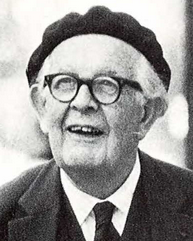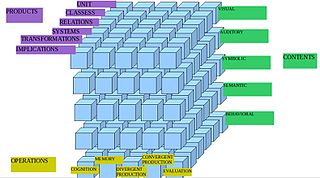Related Research Articles

Jean William Fritz Piaget was a Swiss psychologist known for his work on child development. Piaget's theory of cognitive development and epistemological view are together called "genetic epistemology".
Information processing is the change (processing) of information in any manner detectable by an observer. As such, it is a process that describes everything that happens (changes) in the universe, from the falling of a rock to the printing of a text file from a digital computer system. In the latter case, an information processor is changing the form of presentation of that text file. The computers up to this period function on the basis of programs saved in the memory, having no intelligence of their own.
The psychology of learning refers to theories and research on how individuals learn. There are many theories of learning. Some take on a more behaviorist approach which focuses on inputs and reinforcements. Other approaches, such as theories related to neuroscience and social cognition, focus more on how the brain's organization and structure influence learning. Some psychological approaches, such as social constructivism, focus more on one's interaction with the environment and with others. Other theories, such as those related to motivation, like the growth mindset, focus more on individuals' perceptions of ability.

Piaget's theory of cognitive development is a comprehensive theory about the nature and development of human intelligence. It was originated by the Swiss developmental psychologist Jean Piaget (1896–1980). The theory deals with the nature of knowledge itself and how humans gradually come to acquire, construct, and use it. Piaget's theory is mainly known as a developmental stage theory.
Cognitive development is a field of study in neuroscience and psychology focusing on a child's development in terms of information processing, conceptual resources, perceptual skill, language learning, and other aspects of the developed adult brain and cognitive psychology. Qualitative differences between how a child processes their waking experience and how an adult processes their waking experience are acknowledged. Cognitive development is defined as the emergence of the ability to consciously cognize, understand, and articulate their understanding in adult terms. Cognitive development is how a person perceives, thinks, and gains understanding of their world through the relations of genetic and learning factors. There are four stages to cognitive information development. They are, reasoning, intelligence, language, and memory. These stages start when the baby is about 18 months old, they play with toys, listen to their parents speak, they watch tv, anything that catches their attention helps build their cognitive development.
Egocentrism is the inability to differentiate between self and other. More specifically, it is the inability to accurately assume or understand any perspective other than one's own. Egocentrism is found across the life span: in infancy, early childhood, adolescence, and adulthood. Although egocentric behaviors are less prominent in adulthood, the existence of some forms of egocentrism in adulthood indicates that overcoming egocentrism may be a lifelong development that never achieves completion. Adults appear to be less egocentric than children because they are faster to correct from an initially egocentric perspective than children, not because they are less likely to initially adopt an egocentric perspective.

Conservation refers to a logical thinking ability that allows a person to determine that a certain quantity will remain the same despite adjustment of the container, shape, or apparent size, according to the psychologist Jean Piaget. His theory posits that this ability is not present in children during the preoperational stage of their development at ages 2–7 but develops in the concrete operational stage from ages 7–11.
In psychology, centration is the tendency to focus on one salient aspect of a situation and neglect other, possibly relevant aspects. Introduced by the Swiss psychologist Jean Piaget through his cognitive-developmental stage theory, centration is a behaviour often demonstrated in the preoperational stage. Piaget claimed that egocentrism, a common element responsible for preoperational children's unsystematic thinking, was causal to centration. Research on centration has primarily been made by Piaget, shown through his conservation tasks, while contemporary researchers have expanded on his ideas.
Early childhood is a stage in human development following infancy and preceding middle childhood. It generally includes toddlerhood and some time afterward. Play age is an unspecific designation approximately within the scope of early childhood.
The imaginary audience refers to a psychological state where an individual imagines and believes that multitudes of people are listening to or watching them. Though this state is often exhibited in young adolescence, people of any age may harbor a fantasy of an imaginary audience.
According to Alberts, Elkind, and Ginsberg the personal fable "is the corollary to the imaginary audience. Thinking of themselves as the center of attention, the adolescent comes to believe that it is because they are special and unique.” It is found during the formal operational stage in Piagetian theory, along with the imaginary audience. Feelings of invulnerability are also common. The term "personal fable" was first coined by the psychologist David Elkind in his 1967 work Egocentrism in Adolescence.

Genetic epistemology or 'developmental theory of knowledge' is a study of the origins (genesis) of knowledge (epistemology) established by Swiss psychologist Jean Piaget. This theory opposes traditional epistemology and unites constructivism and structuralism. Piaget took epistemology as the starting point and adopted the method of genetics, arguing that all knowledge of the child is generated through interaction with the environment.
Domain-general learning theories of development suggest that humans are born with mechanisms in the brain that exist to support and guide learning on a broad level, regardless of the type of information being learned. Domain-general learning theories also recognize that although learning different types of new information may be processed in the same way and in the same areas of the brain, different domains also function interdependently. Because these generalized domains work together, skills developed from one learned activity may translate into benefits with skills not yet learned. Another facet of domain-general learning theories is that knowledge within domains is cumulative, and builds under these domains over time to contribute to our greater knowledge structure. Psychologists whose theories align with domain-general framework include developmental psychologist Jean Piaget, who theorized that people develop a global knowledge structure which contains cohesive, whole knowledge internalized from experience, and psychologist Charles Spearman, whose work led to a theory on the existence of a single factor accounting for all general cognitive ability.
Infant cognitive development is the first stage of human cognitive development, in the youngest children. The academic field of infant cognitive development studies of how psychological processes involved in thinking and knowing develop in young children. Information is acquired in a number of ways including through sight, sound, touch, taste, smell and language, all of which require processing by our cognitive system.

Neo-Piagetian theories of cognitive development criticize and build upon Jean Piaget's theory of cognitive development.

Mental operations are operations that affect mental contents. Initially, operations of reasoning have been the object of logic alone. Pierre Janet was one of the first to use the concept in psychology. Mental operations have been investigated at a developmental level by Jean Piaget, and from a psychometric perspective by J. P. Guilford. There is also a cognitive approach to the subject, as well as a systems view of it.
Role-taking theory is the social-psychological concept that one of the most important factors in facilitating social cognition in children is the growing ability to understand others’ feelings and perspectives, an ability that emerges as a result of general cognitive growth. Part of this process requires that children come to realize that others’ views may differ from their own. Role-taking ability involves understanding the cognitive and affective aspects of another person's point of view, and differs from perceptual perspective taking, which is the ability to recognize another person's visual point of view of the environment. Furthermore, albeit some mixed evidence on the issue, role taking and perceptual perspective taking seem to be functionally and developmentally independent of each other.
Developmental psychology initially focused on childhood development through Jean Piaget's four stages of human cognitive development, the last stage of which is known as the formal operational stage. Extending developmental psychology to adults, most neo-Piagetian theories of cognitive development have posited one or more stages of postformal thought. Postformal thought is also addressed by some non-Piagetian theories of developmental psychology, including Michael Commons' model of hierarchical complexity and Otto Laske's constructive developmental framework.
Horizontal and vertical décalage are terms coined by developmental psychologist Jean Piaget, which he used to describe the four stages in Piaget's theory of cognitive development: sensorimotor, preoperational, concrete operations, and formal operations. According to Piaget, horizontal and vertical décalage generally occur during the concrete operations stage of development.
Perspective-taking is the act of perceiving a situation or understanding a concept from an alternative point of view, such as that of another individual.
References
- ↑ Berger, Kathleen Stassen (2014). Invitation to the Life Span (Second ed.). New York: Worth Publishers.
- ↑ Piaget, Jean; Inhedler, Bärbel (1969). The psychology of the child . Basic Books.
- 1 2 McLeod, S. A. "Piaget | Cognitive Theory". Simply Psychology. Retrieved 16 February 2015.
- ↑ Piaget, J. (1977). The role of action in the development of thinking. In Knowledge and development (pp. 17-42). Springer US.
- ↑ Crain, William C. (2005). Theories of Development: Concepts and Applications (Fifth ed.). Upper Saddle River, NJ: Prentice Hall. p. 108.
- ↑ Piaget, Jean (1968) [1964]. Six psychological studies. Translated by Tenzer, Anita; Elkind, David. New York, NY: Vintage Books.
- ↑ Sammons, A (2010). "Tests of egocentrism" (PDF). Psychlotron.org.uk. Retrieved 19 February 2015.
- ↑ Hughes, M. (1975). Egocentrism in preschool children. Unpublished doctoral dissertation. University of Edinburgh.
- ↑ Cole, Michael, Sheila R. Cole, and Cynthia Lightfoot. The Development of Children. New York: Worth, 2004. Print.
- ↑ Galinsky, A., Maddux, W., Gilin, D., & White, J. (2008). Why it pays to get inside the head of your opponent. Psychological Science, 19(4), 378-384.
- ↑ Wood, K. C., Smith, H., Grossniklaus, D. (2001). Piaget's Stages of Cognitive Development. In M. Orey (Ed.), Emerging perspectives on learning, teaching, and technology. Retrieved 17 February 2015, fromhttp://epltt.coe.uga.edu/.